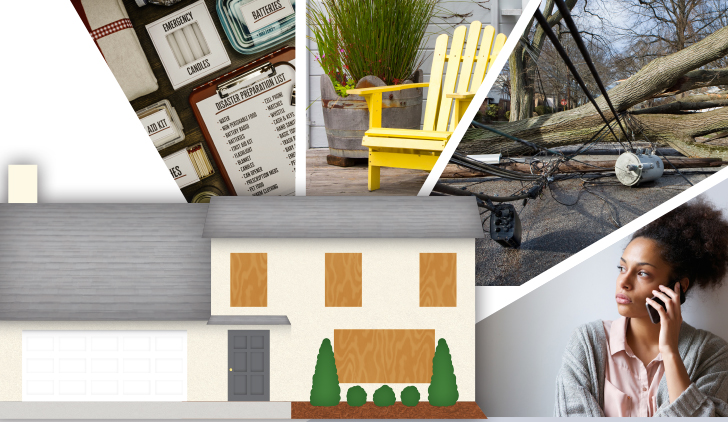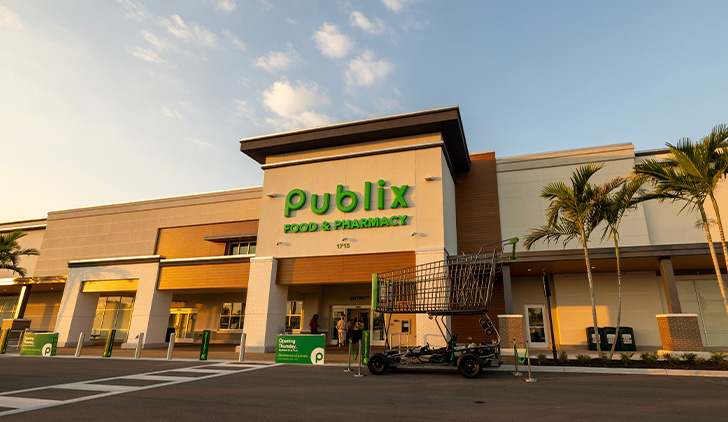
This year’s hurricane season is predicted to be another active one, including at least two storms at Category 3 or higher. It’s always important to be prepared.
Hurricane season is from June 1 – Nov. 30, and storms can quickly change both their path and intensity.
- Take advantage of these tips to make sure you and your family stay out of harm’s way.
- For additional details on preparing for a storm and dealing with the aftermath, see our tips at publix.com.
Stay app-to-date
Knowledge is power, and in today’s digital world, that power is right at your fingertips. Before a potentially catastrophic storm heads in your direction, you can download apps to track and follow storm updates. You can also download news and government apps to keep tabs on important information like sandbag distribution and evacuation warnings.
And don’t forget to download apps to help you through the storm’s aftermath. Popular social media apps can help you stay in touch with friends and family, and to let them know you’re safe. Apps specific to your neighborhood can help you track gas, navigate road closures and more. Check the App Store or Google Play to find available downloads that give you both information and peace of mind.
Get prepared
Planning for a storm may include a few trips to the store to buy supplies. But what about making sure your home can withstand the weather?
Even if you aren’t in a flood zone, there’s a chance you may need to evacuate. Plan your evacuation route, and take note of the local shelters in your area. Make sure to prepare your home for the worst, and take extra steps to try to keep water out. Many counties and municipalities distribute free sandbags in the days and weeks before a storm. Check your area for these supplies, or create your own at home.
If you plan to stay, use the checklist on the right to make sure you’re ready in the event of an emergency.
- Water. FEMA suggests keeping a three-day supply of water available. Store one gallon of water per person per day. Buy bottled water ahead of time, or fill up jugs of water at home.
- Non-perishable foods. Buy items that won’t go bad quickly, even if you do lose power for a few days.
- Flashlights and batteries instead of candles
- First-aid kit
- Backup supply of personal care products
- Pet food, baby food or foods for special diets
- Close-toed shoes like sneakers or work boots
- Prescriptions. Make sure to refill any prescriptions well in advance. You can refill your order online at rx.publix.com or in store. If possible, have at least a one-week supply of all medications, as well as any accompanying medical supplies.
- Contact information for your doctors
- Important documents
The final countdown
Before a storm hits, take crucial steps for your safety.
- Unplug appliances, such as toaster ovens and coffee makers.
- Fill your car’s gas tank.
- Bring loose outdoor items, such as pool inflatables and patio furniture, inside your home or garage. Loose furniture or things left outdoors can end up causing damage to your home or your neighbor’s. Items that are too large or heavy to move inside should be tied down.
- Charge your cellphone.
- Have additional batteries for lamps, flashlights and electronics.
- Bring all pets inside or to a safe and sheltered location.
- If you must evacuate, don’t return home until you’re told it’s safe to do so.
Better together
After the storm, let friends and family know your location. Take photos of any damage to your home. Stay away from fallen power lines and flooded areas. Report any dangerous or hazardous conditions, such as fallen trees, in your area.
If you and your loved ones were spared from any damage, remember there are always people in need — including in your own community. Consider donating any unused, non-perishable items or extra bottled water to your local food bank. These organizations are always in need of donations, especially before and after a natural disaster. Check feedingamerica.org to find the closest food bank location in your area. Numerous charities, nonprofits and disaster relief organizations are also always in need of volunteers. Check with organizations like the American Red Cross and United Way to find out how you can help rebuild your community.
Our Publix, our family
We care about the safety and well-being of our associates. When a storm is predicted to hit your area, you can call our Publix Emergency InfoLine at 1-877-PUBLIX1. This 24/7 hotline gives you information about closings or adjusted hours for your work location. You can also find information on store hours at publix.com/status.
Sources: time.com, noaa.com, weather.gov, fema.gov, publix.com


